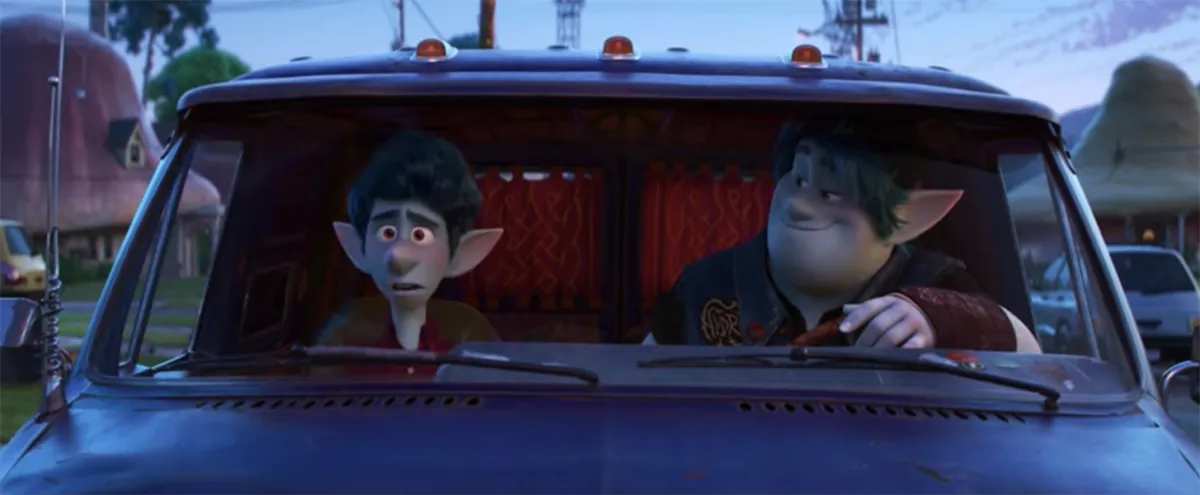The BBC reports that in four Middle Eastern countries, Pixar’s latest film, Onward, is banned. Why? There is one scene when Lena Waithe’s character, Officer Specter, mentions her girlfriend’s child when Barley (Chris Pratt) and Ian (Tom Holland) are trying to trick the cops and get out of trouble using magic.
It’s a real Disney “blink and you miss it” idea of representation, but it’s there, and Officer Specter “has been heralded as Disney-Pixar’s first openly gay character.” According to the BBC, the character choice appears to have been Waithe’s, rather than something that was originally in the script. Waithe told Variety, “I said, ‘Can I say the word girlfriend, is that cool?’ I was just like, ‘It sounds weird.’ I even have a gay voice, I think. I don’t think I sound right saying ‘Husband.’ They were like, ‘Oh yeah, do that.’ They were so cool and chilled. And it ended up being something special.”
It’s nice to hear that the filmmakers and studio supported this bit of characterization, but again, we’re getting the bare minimum, representation-wise. Even so, Officer Specter’s mention of her girlfriend has now caused the film to be banned in Kuwait, Oman, Qatar and Saudi Arabia. Russia is showing the movie, but altered the scene in question, changing “girlfriend” to “partner” and not mentioning Officer Specter’s gender.
This is enraging, and it’s also a real shame. Onward, as a whole, is about the importance of family and its incarnation in many forms. While Officer Specter might be talking about how annoying her girlfriend’s kids are, there’s a fondness in her voice, because that’s her family. Officer Specter’s lines include “It’s not easy being a parent … my girlfriend’s daughter got me pulling my hair out, OK?” and … that’s about it. It’s just a simple, honest statement about being a parent. All of Onward is about what families are willing to do for each other.
Since 2015, I’ve proudly proclaimed that Inside Out was my favorite Pixar movie, because it was a poignant coming-of-age story for a young girl. I felt seen, and I understood the importance of telling these stories for younger generations. Onward also has that Pixar feel that’s all about teaching kids a lesson while making adults sob—but there’s something about Onward that has stuck with me since I reviewed it.
A love letter from director Dan Scanlon to his older brother, and inspired by their own father’s passing when the boys were young, Onward focuses on brothers Ian and Barley. Wilden Lightfoot, their father, got sick and died before Ian got to know him. So, for Ian’s sixteenth birthday, he left a little bit of magic for his sons and, in a world where magic has all but died, the two go on a “quest” together to get to see their father one last time.
What’s important about the movie isn’t that Ian wants to meet his dad, but it’s that he realizes that he already had someone to look up to in his life. Every time I thought I was okay and wouldn’t cry anymore, Onward found a way to punch me in the gut. It’s not only about having a father and understanding what that means, but it’s also very much about the importance of those in your life that you love.
Banning a movie because it doesn’t fit with your antiquated views limits those who need the message of this film, which isn’t about Officer Specter but rather about the idea of family as a whole. Officer Specter, her girlfriend, and her child represent another family, and they hew to the message of the movie. Onward is about loving those in our lives and being there for them in whatever ways they need.
Onward is a movie that will stay with you long after you’ve left the theater. It’s fun, it’s heart-warming, and most importantly, it’s about love and caring for each other, and I think that’s exactly what everyone needs in 2020. It’s upsetting and infuriating to think that many people will not be able to see this film because of the prejudices of a few.
Want more stories like this? Become a subscriber and support the site!
—The Mary Sue has a strict comment policy that forbids, but is not limited to, personal insults toward anyone, hate speech, and trolling.—










Published: Mar 10, 2020 01:31 pm